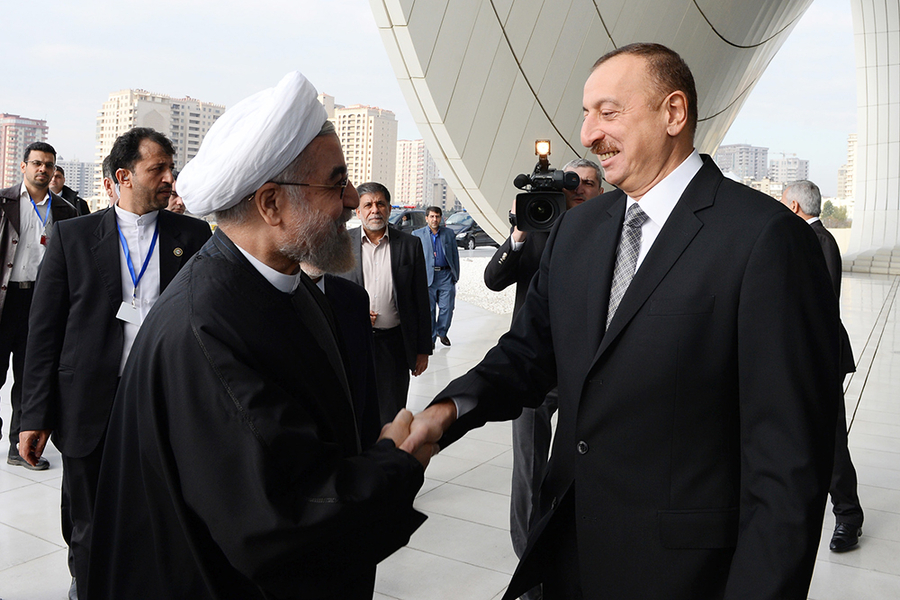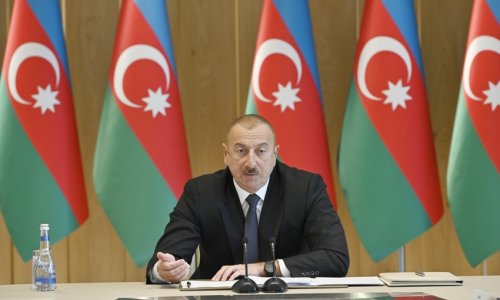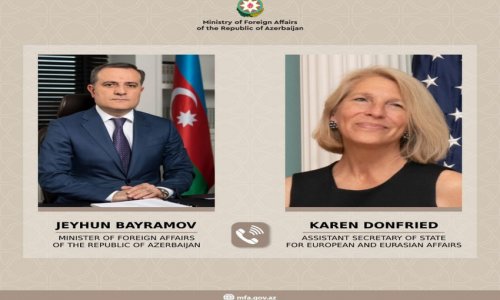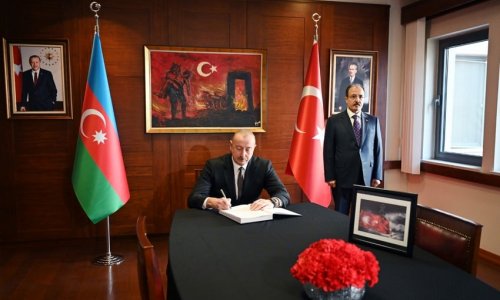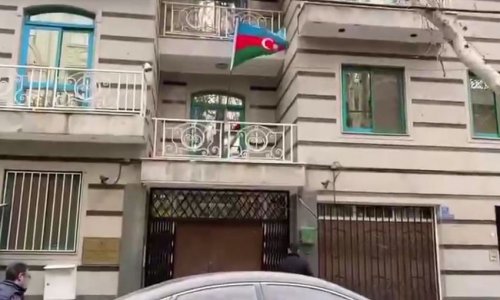After six years of turbulent relations between Iran and the Republic of Azerbaijan, several recent trips by high-ranking Iranian officials to Baku and Azeri ministers to Tehran are the latest signs that the two countries want to forget bad memories and establish closer relations. This rapprochement is in part a response to the mutual security challenges that Iran and Azerbaijan currently face.
"In the wake of the nuclear agreement, numerous companies from across the world are keen to invest in Iran. It is obvious that [Iran’s] neighboring countries, including the Republic of Azerbaijan, are prioritized in this regard,” Iranian President Hassan Rouhani said in a meeting with Azeri Minister of Economy and Industry Shahin Mustafayev in Tehran on August 4.
On February 16, Mohammad Javad Zarif, Iran’s foreign minister, traveled to the capital of Azerbaijan to have meetings with almost all of the country’s high-level officials. President Ilham Aliyev, Speaker of National Assembly Ogtay Asadov, Prime Minister Artur Rasizade, and Foreign MInister Elmar Maddadyarov all had personal meetings with Zarif during his one-day trip.
Before Zarif’s trip, ministers of the Rouhani administration had traveled almost 20 times to Azerbaijan to reinforce security and economic ties. In November 2014, Rouhani himself traveled to Baku with a high-level delegation to hold his fourth meeting with Aliyev. Rouhani has repeatedly said that one of his major foreign policy plans is to improve, expand, and strengthen relations between Iran and its neighbors.
Dark Relations
Enjoying close relations with Israel since 2009, Azerbaijan accused Iran of attempting to assassinate the Israeli ambassador in winter 2012. In late January 2012, Azerbaijan’s Ministry of National Security announced that it had thwarted a conspiracy to assassinate the Israeli ambassador along with managers of Jewish educational centers in Baku. According to the announcement, Iran’s Ministry of Intelligence had plotted the assassination. At the same time, Azerbaijan’s state TV broadcast the confessions of two individuals accused of taking part in the assassination and identified the leader of the terrorist group, based in Ardabil in northwestern Iran, as Azeri citizen Balaqardash Dadashov. Dadashov was reportedly working with Iranian security organizations.
The announcement came almost one month after the assassination of Mostafa Ahmadi Roushan, the last of a series of Iranian nuclear scientists that Tehran has accused Israel of killing. On January 13, Iran’s Supreme Leader Ayatollah Khamenei wrote in his condolence letter to Ahmadi Roushan’s family that Tehran would never forgo the right to punish the assassins.
"Iran was extremely angry with Azerbaijan-Israel cooperation,” a journalist based in Tehran told Lobelog, "Many people in Iran’s Ministry of Intelligence and Foreign Ministry were suspicious that Baku was working with Israel against Iran.”
In reaction to the announcement, Iran’s foreign minister summoned Azerbaijan’s ambassador to communicate its disapproval of Azerbaijan’s cooperation with "Mossad terrorists who organized and performed assassination of nuclear scientists of Islamic Republic of Iran.”
The journalist said that the opening of the Israeli embassy in Baku and the trip of Israeli President Shimon Peres to Azerbaijan on June 29, 2009 were big security threats for Tehran, adding that "there was this strong belief back then in Tehran that Israel had planned to use Azerbaijan’s airbases for a possible attack against Iran’s nuclear sites.”
Peres’s travel to Baku coincided with the Green Movement, the Iranian opposition’s massive street demonstrations against the state. The journalist told Lobelog, "Military and security authorities thought that Israel and Azerbaijan were trying to take advantage of the [domestic] political crisis. Azerbaijan has always welcomed secessionist movements in Iran’s western provinces.”
Two weeks ago Rouhani in his meeting with the Azeri minister of economy and industry talked about third countries trying to destroy ties between the two countries. He did not name those "third countries,” but he was no doubt referring to Israel.
Continued Challenges
Iran and Azerbaijan share a 759-kilometer border. Azerbaijan abuts the Iranian provinces of Ardabil and Eastern Azerbaijan where the inhabitants speak Azeri Turkish. In recent years, Iran has accused Azerbaijan of attempting to "promote racial segregation” or "espionage” by sending intelligence agents to the province of Eastern Azerbaijan.
Press TV, the English-language news satellite channel of Iran, quoted an official of the province of Eastern Azerbaijan on July 1, 2012 that two citizens of the Republic of Azerbaijan were arrested in the province, "Documents and evidences show that Shahryar Hajizadeh and Farid Husseinov were sent to Iran by Azerbaijan’s intelligence service,” the news channel claimed. "They were sent to hire some Iranian protesters in line with their secessionist goals.”
Another issue that frayed relations between the two countries from 2009 to 2013-during Mahmoud Ahmadinejad’s second presidential term-involved LGBT issues. In May 2012, a month prior to the Eurovision Song Contest in Baku, Iran’s high-level Shiite clerics in Qom, Tabriz, and Ardabil criticized Azerbaijan for hosting the contest and claimed that gays and their advocates would be marching in the event.
Despite all of these tensions, however, relations between Tehran and Baku have never passed the point of no return during all these turbulent years.
Shireen Hunter, a professor of international relations at Georgetown University who follows Eurasian trends, said in an interview with Lobelog: "Despite all differences, however, the two countries have always tried not to let tensions deteriorate beyond a certain point.”
Mutual Interests
Hunter believes that Baku has reasons for improving relations with Tehran. "Azerbaijan needs Iran partly because it can only access the autonomous region of Nakhijevan through Iran. Nakhijevan itself can hardly survive without Iran. Also already caught in a conflict with Armenia, Azerbaijan cannot afford conflict with Iran, and nor can Iran. Moreover, a large number of Azeris visit Iran for medical treatment and shopping.”
Hunter argues that Salafist threats are the main reason for the recent warming trend in relations. "Azerbaijan’s economic difficulties following the drop in oil prices, the Russian-Iranian rapprochement, but perhaps more important the rise of Sunni, including Salafist, activism in Azerbaijan could move it to put relations with Iran on a more solid and lasting understanding if not actual friendship.”
Mohsen Pak Aein, the Iranian ambassador to Azerbaijan, said in an interview with KhabarOnline that the "common fight against terrorism and extremism” was one of the objectives of Zarif’s recent travel to Baku.
Iran is in a critical period. Its southern neighbors around the Persian Gulf are not much interested in expanding relations with Tehran, Iraq has been an unstable and insecure neighbor, Pakistan has never been a reliable neighbor, and relations with Turkey are distant because of the Islamic State (ISIS or IS) and the Syrian crisis. With Azerbaijan, Iran can secure close ties with a secure and strategically positioned neighbor.
Azerbaijan is not just concerned with the growth of extremist Islam. Like other Soviet successor states, it is worried about its sovereignty in light of Russian President Vladimir Putin’s ambitions. Meanwhile, Iran has not been successful in its attempts to improve relations with Persian Gulf countries, is in a critical phase in its nuclear talks, and is involved in fighting IS as a part of the civil wars raging in Syria and Iraq.
That the Iranian and Azeri presidents have met four times during a nine-month period in 2014 demonstrates that the two countries see the necessity of quickly improving their mutual relations, especially now that they are both struggling with serious security challenges.
(payvand.com)
www.ann.az
Follow us !

